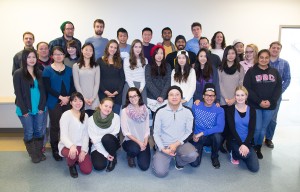The IB Handbook of Procedures
During class today, we collaborated together in our subject area groups and went through the different sections of the IB Handbook of Procedures for 2014. The purpose of the activity was so that we could become familiarized with how the IB Diploma Programme functions. Isobel also mentioned that we may be asked certain questions during interviews such as what conditions need to be met in order for students to receive their diplomas. Although, admittedly, most of us in the class were confused as to why we were spending time in the class doing this exercise.
I think it would be more useful if I were to read through the handbook by myself one day; it was hard to understand some of the points people were presenting about what they had read in the handbook because there are still a lot of terms that we are unfamiliar with (e.g. “school based curriculum” came up several times in my group’s sections and we were unable to quite understand what it meant until we did some research). However, the questions that Isobel asked all seemed to be quite relevant, and it would definitely be helpful to have more sessions in the future where we can learn more about the program after we’ve had a chance to learn some teaching strategies and had time go through some of the details about IB on our own.
The following are some notes that I took during this activity on section A11 of the handbook, which is all about the reporting of results:
A11.1 The Schedule
- Established schedules every May and November for issue of results data, as well as times when enquiries are allowed
A11.2 Issue of Results to Schools
- IB marks released on IBIS (IB Information System) July and January 5th to IB coordinators
- stats on global and school results available a few days later (9th)
- IB coordinators are the intermediary between IB candidates and the IBO; the IBO does not directly issue marks to or discusses marks with candidates and their parents
A11.3 Issue of Results to Candidates
- IB marks available on https://candidates.ibo.org to IB candidates on July and January 5th
- PINS for accessing website only issued once, and should only be used by the candidate, they are not to be given to universities or admissions centres
A11.4 Candidates and the IB Alumni Network
- alumni of the IB programme can register at https://candidates.ibo.org, using their personal code and PIN
- receive newsletters and invitations to conferences, and can provide feedback to improve the programme
A11.5 Issue of Results to Universities and Admissions Centres
- the IBIS can send a candidate’s results directly to universities and admissions centres in both electronic and paper format
- a candidate can request for results to be sent to 6 institutions (however, of these, only one can be in Canada and one in the US)
- transcripts for anticipated candidates who do not continue on to complete the DP can also be request by an IB coordinator
A11.6 Early Session Entries
- when a candidate completes all session components six months prior to a subject not currently available in their diploma session, the results will be issued but no certification will be rewarded until the next session
A11.7 The Interpretation of Results
- if a candidate retakes a subject/level, only the highest grade contributes to their diploma
- diploma will not be rewarded if a candidate’s results contain a requirement code
- candidates cannot change their combination of subjects in order to receive their diploma (i.e. cannot switch an additional subject for one of the 7 that contribute to their diploma)
A11.7.1 Diploma Awarded
- all conditions of “General regulations: Diploma Programme” met
A11.7.2 Bilingual Diploma Awarded
- awarded if the candidate fulfills one or both of the following conditions:
- scores greater than a 3 in two languages from group 1
- scores greater than a 3 in their group 1 language and greater than a 3 in a group 3 or 4 subject that is not taken in their group 1 language
A11.7.3 Diploma Not Awarded (Letters given rather than a score)
- “P” indicates the IB Assessment Centre does not have sufficient information to issue a grade
- “N” indicates that no grades have been issued for the following reasons:
- withdrawal from exam
- absence from one or all of the exams
- failure to meet one or more exam requirements
- breach of regulations (letter will be sent to IB coordinator with details)
A11.8 Diploma Requirement Codes
- diploma will not be rewarded if a candidate’s results contain a requirement code (i.e. indicate what requirements for the diploma have not been met)
A11.9 Candidates Affected By Special Circumstances
A11.9.1 Candidates with Learning Support Requirements
- candidates eligible for inclusive assessment arrangements (e.g. learning difficulties, emotional or behavioural difficulties, physical, sensory or medical conditions, or mental health problems) can have reasonable accommodation authorized
A11.9.2 Candidates Affected By Temporary Circumstances
- any circumstances during the two year programme or the examination period that could negatively affect the student’s performance will not be recorded in the candidate’s documents
A11.10 Candidates Suspected of Academic Misconduct
- an “N” will appear on the IBIS, but will not be recorded in the candidate’s document that is sent to universities and admissions centres (this information is regarded as confidential)



